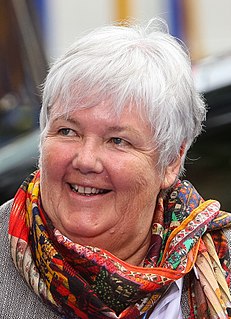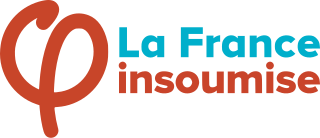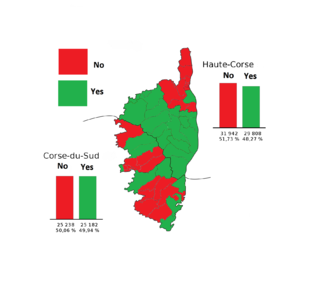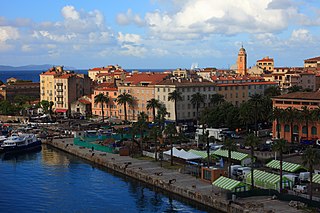
The Radical Party of the Left is a social-liberal political party in France. A party in the Radical tradition, since 1972 the PRG was a close ally of the major party of the centre-left in France, the Socialist Party. After the 2017 presidential and legislative elections, negotiations to merge the PRG with the Radical Party began and the refounding congress to reunite the parties into the Radical Movement was held on 9 and 10 December 2017. However, a faction of ex-PRG members, including its last president Sylvia Pinel, split from the Radical Movement in February 2019 due to its expected alliance with La République En Marche in the European elections and plans to resurrect the PRG.
Corsica Nazione is a Corsican nationalist party which aims to gain control over Corsica from France, regain national rights, and promote the Corsican national identity. The Corsican Nation have been struggling for a national identity since the Treaty of Versailles (1768) when they were annexed to France and claim to be repressed culturally, economically, and socially.

The Party of the Corsican Nation is a Corsican nationalist and autonomist political party on the French island of Corsica. It was founded in Corte in 2002 by members of three nationalist parties, Union of the Corsican People (UPC), A Scelta Nova and A Mossa Naziunale.
Émile Zuccarelli is a French politician from Corsica. He serves as honorary President of the Radical Party of the Left and is a former mayor of Bastia. Before his defeat in the French legislative election, 2007, he was deputy for Upper Corsica.

Jacqueline Gourault is a French politician.
Marcel Francisci was an alleged member of the Unione Corse who was accused of masterminding the French Connection drug network. As a young man, Francisci fought in World War II and was awarded the Croix de Guerre. Following the war, he developed a business empire that included casinos in Britain, France and Lebanon. Francisci served in the general council of the Corse-du-Sud (UDR) and was a member of the Civic Action Service (SAC), a Gaullist militia. He was assassinated in Paris in 1982.

Corsican nationalism is a nationalist movement in Corsica, France, active since the 1960s, that advocates more autonomy for the island, if not outright independence.

The Corsican Donkey, French: Âne corse, Corsican: U sumeru corsu, is a breed of domestic donkey from the Mediterranean island of Corsica, a région and territorial collectivity of France. It is not recognised by the Ministère de l'agriculture, de l'agroalimentaire et de la forêt, the French ministry of agriculture, or by the Haras Nationaux, the French national stud; nor is it reported to the DAD-IS database of the FAO. Its numbers have fallen alarmingly; two associations are seeking its official recognition as a breed.

Legislative elections were held on 11 and 18 June 2017 to elect the 577 members of the 15th National Assembly of the French Fifth Republic. They followed the two-round presidential election won by Emmanuel Macron. The centrist party he founded in 2016, La République En Marche! (REM), led an alliance with the centrist Democratic Movement (MoDem); together, the two parties won 350 of the 577 seats – a substantial majority – in the National Assembly, including an outright majority of 308 seats for REM. The Socialist Party (PS) was reduced to 30 seats and the Republicans (LR) reduced to 112 seats, and both parties' allies also suffered from a marked drop in support; these were the lowest-ever scores for the centre-left and centre-right in the legislative elections. The movement founded by Jean-Luc Mélenchon, la France Insoumise (FI), secured 17 seats, enough for a group in the National Assembly. Among other major parties, the French Communist Party (PCF) secured ten and the National Front (FN) obtained eight seats. Both rounds of the legislative election were marked by record low turnout.
The 2015 Corsican protests were a series of marches by several hundred Corsican nationalists that began on 25 December, in Ajaccio, capital of Corsica. During the initial demonstrations, a Muslim prayer hall was burned down and Qur'ans were set alight. Further protests were organised after the initial march despite a government ban on protests until 4 January 2016. The protesters claimed to be acting in revenge for an incident that occurred the day prior when firefighters and police were assaulted in the neighbourhood of Jardins de l'Empereur; however, outside observers labeled the ensuing riots as anti-Arab and anti-Muslim. The Corsican nationalist politicians have claimed their view does not legitimise xenophobia, blaming the protest on French nationalism instead. Scholarly opinions on this claim are divided.

La France insoumise ([la fʁɑ̃s ɛ̃.su.miz]; variously translated as "Unbowed France", "Unsubmissive France", or "Untamed France" is a democratic socialist, left-wing populist political party in France, launched on 10 February 2016 by Jean-Luc Mélenchon, then Member of the European Parliament and former co-president of the Left Party. It aims to implement the ecosocialist programme L'Avenir en commun.
The La France Insoumise group is a parliamentary group in the National Assembly including representatives of La France Insoumise (FI) after the 2017 legislative elections.
Marie-Jeanne Bozzi was a Corsican local politician and convicted criminal who was assassinated in 2011.

Edmond Simeoni was a Corsican politician and nationalist. He was the brother of Max Simeoni, Member of the European Parliament (MEP) from 1989 to 1994 and father of Gilles Simeoni.

















